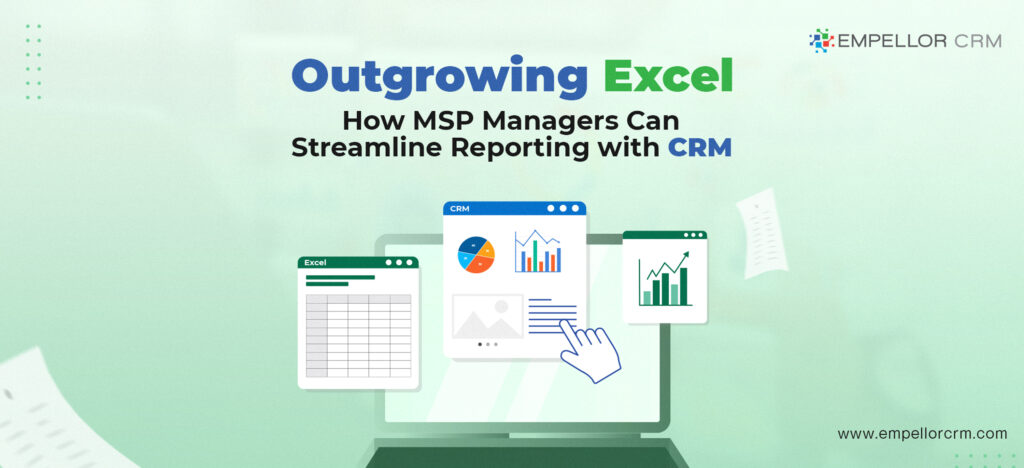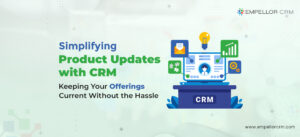As a manager, you’re responsible for ensuring that your team operates efficiently, that data is reliable, and that the business remains profitable. For many managers, Excel has been the go-to tool for years, helping with everything from tracking sales to generating reports. But as businesses grow, Excel often becomes more of a burden than a solution. That’s when it’s time to streamline reporting with CRM to boost efficiency and accuracy.
In this blog, we’ll explore how MSP managers can streamline reporting and improve overall efficiency by transitioning from Excel to a Customer Relationship Management (CRM) system. We’ll discuss the pain points of outgrowing Excel and how a CRM can help solve those challenges, ultimately allowing your team to focus on what truly matters.
When Excel Becomes a Bottleneck for Managers
Excel’s flexibility makes it a popular choice for businesses starting out. It’s quick to set up, familiar to employees, and doesn’t require a major investment. But as companies grow and operations become more complex, Excel’s limitations begin to emerge. For managers, this shift can create significant challenges, including:
1. Inconsistent Data and Reporting
As your business grows, so does the number of spreadsheets you need to maintain. Often, different departments or team members maintain their own versions, leading to inconsistent or outdated data. This makes it difficult to generate accurate reports or track performance across the company.
2. Manual Processes Slow You Down
Excel requires a lot of manual input and upkeep, which means more time spent on administrative tasks instead of focusing on strategic initiatives. Managing pricing, quoting, and sales data across multiple spreadsheets eats into valuable time and increases the likelihood of errors.
3. Lack of Visibility Across the Business
As your company scales, having real-time visibility into your operations is essential. Excel isn’t built to provide a comprehensive view of your business performance, and as a result, managers are often left making decisions based on outdated or incomplete information.
The Pain Points of Outgrowing Excel
For managers, outgrowing Excel can be frustrating, especially when it impacts efficiency and business outcomes. The common pain points include:
- Inconsistent Pricing: Relying on Excel for pricing consistency can lead to errors and inconsistencies. When your business expands, keeping pricing aligned across teams becomes more challenging, leading to delays in quotes or pricing errors that affect profitability.
- Inefficient Reporting: Generating accurate reports requires data from multiple sources, often compiled manually. This process is time-consuming, prone to mistakes, and often results in reports that don’t reflect real-time performance.
- Poor Scalability: Excel doesn’t scale well with growing businesses. The more data you have to manage, the harder it becomes to maintain efficiency and accuracy. As your business evolves, Excel starts to hold you back rather than propel you forward.
How a CRM Transforms Business Reporting and Efficiency
Transitioning from Excel to a CRM system like Microsoft Dynamics 365 can be a game-changer for MSP managers. Here’s how a CRM addresses the pain points associated with outgrowing Excel:
1. Centralized Data for Accurate, Real-Time Reporting
A CRM centralizes all of your business data in one platform. This means no more juggling multiple spreadsheets or relying on outdated information. With a CRM, you have access to real-time data that reflects the latest sales, customer interactions, and operational metrics, allowing you to make informed decisions quickly.
By automating data collection and reporting, a CRM eliminates the manual work associated with Excel. Reports that used to take hours or even days to compile can now be generated in minutes with up-to-date information.
2. Consistency in Pricing and Quoting
A CRM ensures that your pricing and quoting processes are consistent across the board. Instead of relying on individual team members to manually update pricing in Excel, a CRM system standardizes pricing and quoting based on real-time data. This reduces errors and ensures that your team is always working with the most accurate information.
With built-in quoting tools, managers can easily track the status of quotes, ensuring that nothing falls through the cracks and that all quotes are aligned with the company’s pricing strategy.
3. Scalability for Growing Operations
As your business grows, a CRM scales with you. Unlike Excel, which becomes harder to manage as data increases, a CRM is designed to handle large volumes of data without sacrificing performance or accuracy. Whether you’re managing hundreds of clients or expanding your service offerings, a CRM can keep up with your needs.
In addition, CRM systems are built to integrate with other tools and systems, such as marketing platforms or accounting software, ensuring that all aspects of your business are connected and aligned.
4. Improved Collaboration Across Teams
One of the major advantages of a CRM is that it allows for better collaboration across teams. Sales, marketing, and customer service can all access the same centralized data, ensuring that everyone is working with the same information. This leads to more consistent reporting, fewer miscommunications, and a more cohesive team effort.
Streamline Reporting and Grow Your Business with CRM
The limitations of Excel become apparent as businesses grow. For managers tasked with keeping teams efficient and reporting accurate, transitioning to a CRM system is the key to unlocking new levels of productivity and growth.
By centralizing data, automating processes, and improving collaboration, a CRM like Microsoft Dynamics 365 helps managers overcome the inefficiencies of Excel and focus on strategic decision-making. Instead of wasting time on manual reporting or managing multiple spreadsheets, you can leverage real-time insights to drive better business outcomes.
If your business has outgrown Excel, it’s time to explore the benefits of a CRM solution. Contact us today to learn how Microsoft Dynamics 365 can streamline your operations and help your business thrive.




